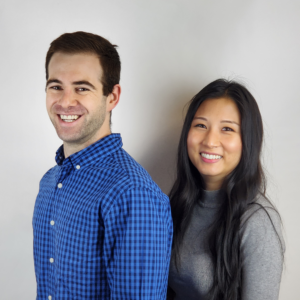When Antithesis Foods’ most recent brand, Protos, hit the shelves in January, customers craved the crunchy crisps that provide a healthier snacking experience without compromising on taste. Consumers weren’t the only ones to take notice, as the company—founded by eLab alumni Ashton Yoon, MPS ’17, MS ’19, and Jason Goodman, Ph.D. ’21—was recently awarded a National Science Foundation (NSF) Small Business Innovation Research (SBIR) Phase II award totaling nearly $1 million to continue scaling its legume-based dough innovation.
The NSF award is the second for the company, which landed an NSF SBIR Phase I award in 2019, leading to the perfection of the gluten-free pita chip which comes in three classic flavors—Simply Salted, Summer Barbeque, and Sour Cream and Onion. Packed with eight grams of protein and fiber per serving while remaining low in calories, Protos were immediately a hit.
“We did a sensory test at the Department of Food Science’s Sensory Evaluation Center at Cornell and people were emailing us from the sensory test asking, ‘Where can I buy this? This is so good, I love it!’ We have people that are long-time customers now because of that sensory test,” said Yoon, COO and co-founder.

With Protos on their minds and in their stomachs, it’s impossible for customers not to wonder what is next for Antithesis with its Phase II funding. Having developed their technology into a legume ingredient platform during Phase I, creating various shapes, flavors, textures, and nutritional profiles for applications across food categories, the business has lofty goals as it continues to expand and move forward.
“In addition to Protos, we’re also exploring what we’re calling ‘mix-ins,’” Yoon said. “They’re little pieces that you can put in ice cream, yogurt, or a protein bar. In addition to finished products, like a chip, we’re looking to sell these mix-ins to other companies that would put them in their product.”
These bits will mix things up for the business in more ways than one. Not only can they replace cookies, granolas, and crushed graham crackers in desserts while serving as a hidden source of protein and fiber, but they will enable Antithesis to form vital connections with commercial partners, a cornerstone of the company’s Phase II goals.
“With this grant, the goal of the company is to take things that crunch and make them better for you,” said Goodman, CEO and co-founder. “Anyone who has anything that crunches and would like to explore opportunities to make it better for you, we’re happy to do that. That’s the point of Phase II – find partners, work with them, and launch a product using food technology.”
Among Antithesis’ additional goals for its funding includes scaling the proof of concept established in Phase I to the mass manufacturing levels needed to support and nurture these relationships with commercial partners. Adding valuable members to the company’s team is front-of-mind for the business in doing so, who is currently hiring an Associate Scientist to join their research and development team, as well as a Sales and Marketing Associate.
As Antithesis continues to build meaningful relationships with business partners, it will harness the feeling of community that has surrounded the company since its founding and participation in eLab, Cornell’s student accelerator, in 2017.
“Just seeing the entrepreneurship community at Cornell sparked the idea that we should apply to eLab,” Yoon said. “That’s what got me thinking about how to build a business and be an entrepreneur and is what got me intoxicated by it. Without the initial touchpoint in eLab, I don’t know how far we would have gone.”
It’s this very sense of community at Rev: Ithaca Startup Works—a business incubator established by Cornell in collaboration with Ithaca College and Tompkins Cortland Community College—that has helped push Antithesis to where it is today. Through its participation in the Rev Accountability Board program, the company has received meaningful guidance from the incubator’s Entrepreneurs in Residence, placing the business on its upward trajectory.
“We talk to them every month about our goals, what’s working, and what’s not working, and they give thoughtful feedback from a diverse set of people,” Goodman said. “Continuing to build that mandatorily into the company, in addition to the introductions and the networking, has been incredibly helpful.”
With its innovative legume technology, funding from the NSF SBIR Phase II award, and the strong startup community that Antithesis is a part of, the future is bright for the company as it continues to scale. No matter the heights that the business soars to, its foundation will have played a vital role in its success.
“The entrepreneurship network connects all throughout Cornell and Ithaca in general,” Goodman said. “It’s been really enriching to be a part of the whole community, and Rev and eLab have been at the center of it all.”

